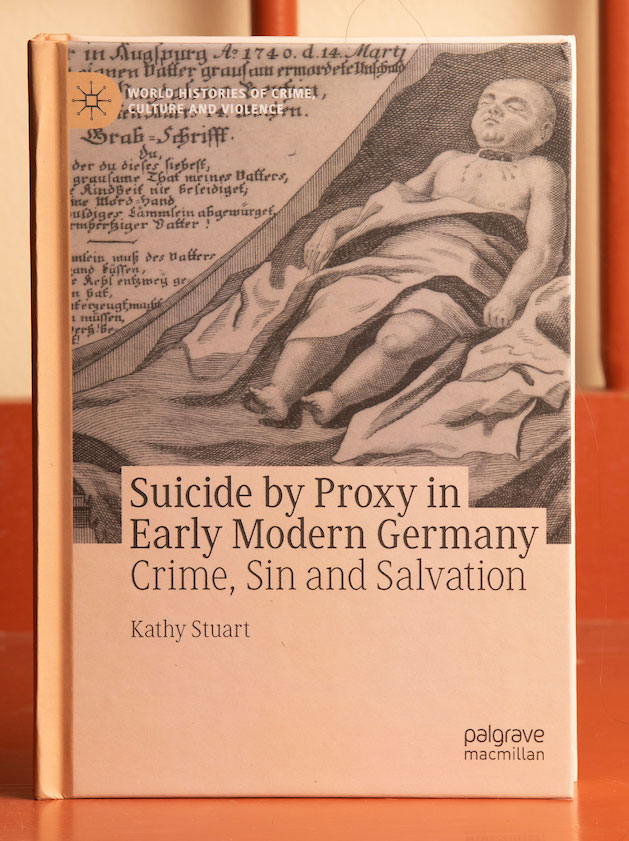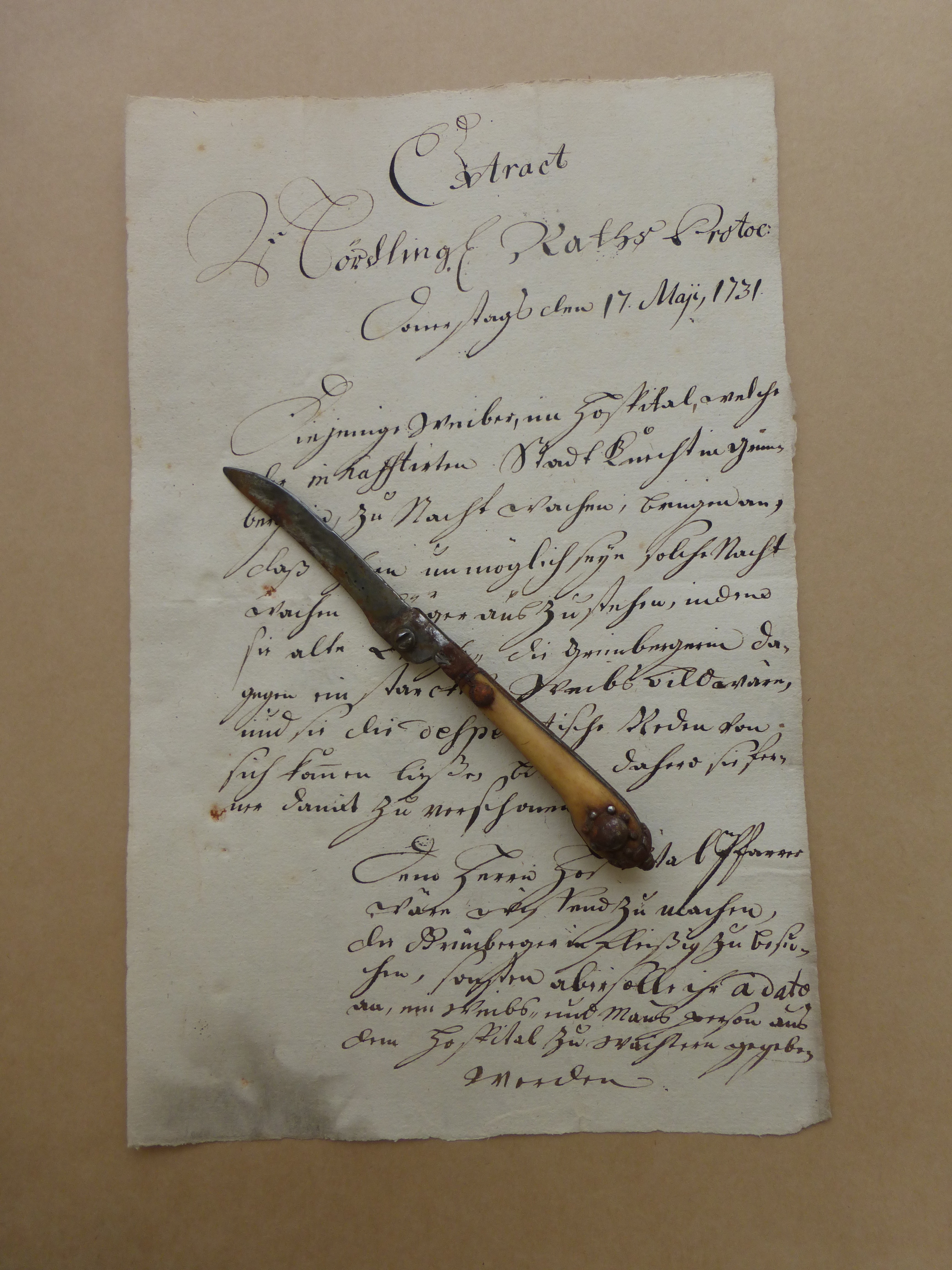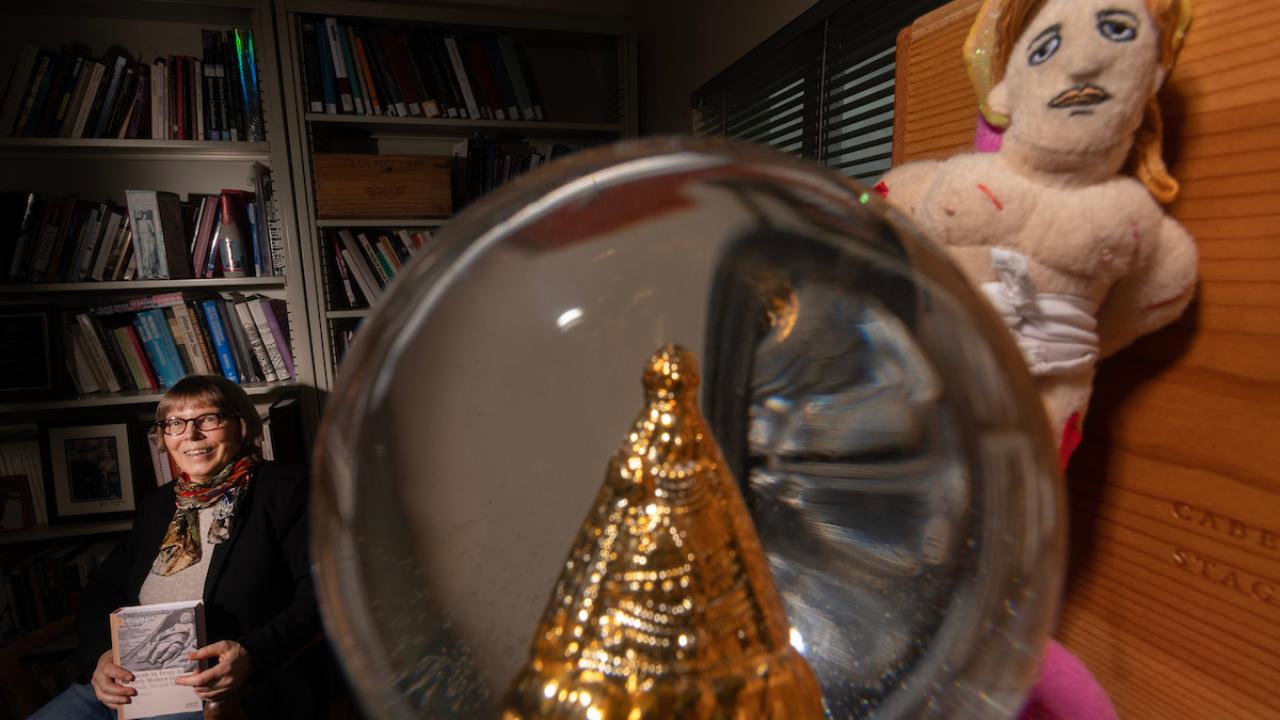Kathy Stuart, associate professor of history, delights in crime and deviance — her research specialty. The University of California, Davis, academic’s enthusiasm for blood, heinous crimes and the various ways people kill each other hovers somewhere between an obsessed prosecutor and a delighted child who takes in horror movies on Saturday afternoons.
Her list of classes taught ranges from the conventional “Crime and Punishment in Early Modern Europe,” to the more intriguing “Satan or a Disordered Spleen? The Experience of Madness in Early Modern Europe.” She decorates her office with found objects, including religious amulets similar to those murderers had on their bodies when executed — conversation starters for student and faculty visitors alike.
Like much historical research, Stuart’s classes and studies shed light on how people reacted to their environments.
Now her research has inspired a period film, The Devil’s Bath, based on her latest research and book, Suicide by Proxy in Early Modern Germany: Crime, Sin and Salvation (Palgrave MacMillan, 2023). The movie will premiere Feb. 20 at the Berlin International Film Festival, or Berlinale, in German, her native language. The annual festival is among the “Big Three” alongside the Venice Film Festival and Cannes Film Festival. Filmmakers hope to bring it to the United States in the near future, and Palgrave is reissuing the book in paperback in conjunction with the movie’s release.

“It’s so exciting,” Stuart said. “I never dreamed anything like this would happen.
“I’m finding myself shopping for fancy clothes,” added Stuart, who prefers to hang out in a T-shirt and jeans and live her usual casual life, humbly teaching and researching while agreeing to an occasional speaking engagement or media interview.
Suicide by proxy
The new movie, like the book, deals with a practice common during two centuries in Western Europe, whereby suicidal people, predominantly women, would murder children, primarily. The heinous act originated, ironically, as a way to avoid hell. In lieu of killing themselves to escape their depression and lives of anguish — and face eternal damnation for the sin of suicide — they would kill a young child, punishable by execution. Before their execution they could receive absolution by a priest, repent, and ultimately ensure themselves a path to heaven instead. The practice, and the book, intersects with poor understandings of mental health and depression, particularly in women, religious practices and even accusations of witchcraft and demonic possession during the 17th and 18th centuries.

Based on historical records Stuart uncovered for her book, the movie is inspired by the true stories of women who attempted to end their lives by committing murders, predicting — not always accurately — that they could achieve their ultimate goal of death, escaping their unhappy lives when the government executed them. The Devil’s Bath sheds light on the plight of women of that era.
Stuart has not yet seen the movie.
“The victims were usually children, as it was assumed that they were still in a state of innocence,” Stuart said of her research. “You could possibly even be doing the child a favor, because it would go to heaven not yet having sinned. And you yourself would also go to heaven, because you had been absolved from your sins by a priest in confession — it’s a terrible kind of win-win situation.”
Research comes to light
The filmmakers learned of Stuart’s expertise in this practice even before the book was published, hearing her interviewed on the podcast This American Life, in 2012. That podcast is aired on public radio affiliates throughout the world.
Two days before the film’s showing in Berlin, Stuart will team up with Austrian filmmakers Veronika Franz and Severin Fiala, a duo well-known in their recent past for their horror films, or suspenseful psychodramas, for a panel discussion on The Devil’s Bath.
The discussion, Stuart recently learned, will be recorded as it’s delivered at the Berlin Museum of Medical History of the Charité as bonus material for the DVD of the film. Stuart consulted on the film and helped with the English subtitles.
The film stars actress Anja Plaschg, which grew in importance for Stuart when she learned her undergraduate students were familiar with Plaschg, as a singer, too, known as Soap&Skin.
Michael Saler, also a professor of history at UC Davis and a fan of the work of both Stuart and the filmmaking duo, is thrilled the filmmakers have discovered Stuart. He said her work is right in line with their dramas, which commonly feature women and children in suspenseful circumstances.
“There are so many movies that try to get history right,” he said. “In her case a historian is inspiring a work — that is truly something.”
Common practice
The practice was relatively common with both Protestants and Catholics, Stuart said, and represented a high murder rate even compared to modern times. She uncovered about 400 cases in the territories of the Holy Roman Empire, or German-speaking Central Europe, between 1580 and 1839. There were 95 cases of suicide by proxy in arch-Catholic Vienna between 1668 and 1783, for example.
She did much of her research while teaching in Vienna, something she documents on Instagram. "Teaching a UC Davis Summer Abroad Program in Vienna over several years enabled me to retrace the footsteps of some the Viennese murderous protagonists who I feature in this book, my students in tow."
Stuart’s research — and the movie too, she hopes — sheds light on the plight of women whose lives during that era were defined by religious dogma and taboos. “Many saw this as their only way out.”
Media Resources
Related:
Media Contact:
- Karen Nikos-Rose, News and Media Relations, 530-219-5472, kmnikos@ucdavis.edu
